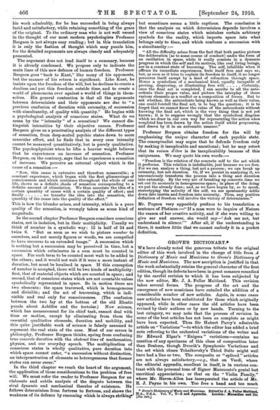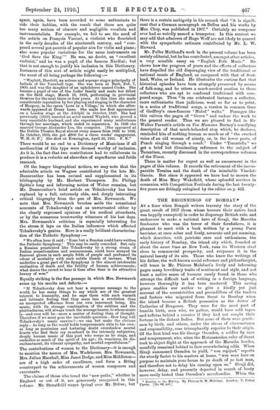GROVE'S DICTIONARY.*
Ws have already noted the generous tribute to the original editor of this work involved in the change of title from A Dictionary of Music and Musicians to Grove's Dictionary of Music and Musicians. The new ascription is justified in that the work substantially retains the general character of the first edition, though its defects have been in great measure remedied by the careful revision to which it has been subjected by the new editor, Mr. J. A. Fuller Maitland. This revision takes several forma. The progress of the art and the emergence of new musicians have entailed the addition of a considerable number of new articles. Again, in some cases new articles have been substituted for those which originally appeared, while in other cases the old articles have been revised by their authors or by new hands. Turning to the last category, we may note that the process of revision in some of the best articles has not been as complete as might have been expected. Thus Sir Hubert Parry's admirable article on " Variations "—to which the editor has added a brief note referring to the orchestral variations of the writer and Sir Edward Elgar's " Enigma " variations—contains no mention of any specimens of this class of composition later than Brahma, though Dvonik's Symphonic Variations and the set which closes Tchaikovsky's Third Suite might well have had a line or two. The composite or " spliced " articles are not always satisfactory,—e.g., that on Verdi, where the editorial appendix, excellent in itself, is in curious con- trast with the personal tone of Signor Mazzucato's genial but uncritical appreciation; or that on the " Violin Family," where Mr. Heron-Allen has incorporated the article of Mr. E. J. Payne in his own. Too free a hand and too much • Groves Dictionary of Music and Musicians. Edited by d. A. Puller Maitland. M.A., F.S.A. Vol. V., T—Z and Appendix. London: Macmillan sad CO. [21s. net.]
space, again, have been accorded to some enthusiasts to ride their hobbies, with the result that there are quite too many notices of obscure and negligible vocalists and instrumentalists. For example, we fail to see the need of the article on Francois Vaccari, a violinist who. flourished in the early decades of the nineteenth century, and " com- posed several pot-pourris of popular airs for violin and piano; also some popular variations for the same instruments on God Save the King." He was, no doubt, an " excellent violinist," and he was a pupil of the famous Nardini; but that is not enough to justify his inclusion in this Dictionary.
Instances of this sort of article might easily be multiplied, the worst of all being perhaps the following:-
"Waylett, Harriett, an actress and soprano singer principally of ballads of the Vauxhall type. She was born at Bath, Feb. '7, 1800, and was the daughter of an upholsterer named Cooke. She became a pupil of one of the Loder family and made her d6but on the Bath stage, March 16, 1816, performing in provincial theatres for the next three or four rears. At this time she made considerable reputation by her playing and singing in the character of Margery, in the opera 'Love in a Village,' in which she after- wards appeared at Drury Lane. She made her first appearance on a London stage at the Adelphi in October, 1820. She had previously (1819) married an actor named Waylett, who proved a very unsuitable husband, and she experienced many misfortunes through her marriage, which ended in separation. In 1826 she married George Alexander Lee, the composer. [She appeared at the Dublin Theatre Royal almost every season from 1826 to 1836. In October, 1835, she got 4800 for a three weeks' engagement. W. H. G. F.) She died at Kensington, April 26, 1851. F. K."
There would be no end to a Dictionary of Musicians if all mediocrities of this type were deemed worthy of inclusion. As it is, the fact that two contributors had to collaborate to produce it is a I-audio ad absurdum of superfluous and futile
research.
Of the longer biographical notices, we may note that the admirable article on Wagner contributed by the late Mr. Dannreutber has been revised and supplemented in its bibliography by Mr. Herbert Thompson. Dr. Philipp Spitta's long and informing notice of Weber remains, but Mr. Dannreuther's brief article on Tchaikovsky has been replaced by a full, extremely able, and deeply interesting
• critical biography from the pea of Mrs. Newmarch. We note that Mrs. Newmareh brushes aside the sensational accounts of Tchaikovsky's end as unwarranted either by the clearly expressed opinions of his medical attendants, or by the numerous trustworthy witnesses of his last days. Mrs. Newmarch's criticism is especially interesting for the stress it lays on the Italian influences which affected Tchaikovsky's genius. Here is a really brilliant characterisa- tion of the Pathetic Symphony :— We often hear it said : None but a Russian could have written the Pathetic Symphony.' This may be easily conceded. But only a Russian penetrated like Tchaikovsky by a strong strain of Italian sensationalism and sensuousness, could have arrayed its funereal gloom in such ample folds of purple and perfumed its odour of mortality with such subtle blends of incense. What underlies a great part of the Symphony is the almost intolerable realisation of death and the futility of human achievements ; what draws the crowd to hear it time after time is its attractive luxury of woe."
Equally striking is the fine passage in which Mrs. Newmarch sums up his merits and defects
" If Tchaikovsky does not bear a supreme message to the world, he has many things to say which are of the greatest interest to humanity, and he says them with such warmth and intimate feeling that they seem less a revelation than an unexpected effluence from our own innermost being. His music, with its strange combination of the sublime and the platitudinous, will always touch the average hearer, to whom music is—and ever will be—more a matter of feeling than of thought. Therefore if we must pose the inevitable question—How long will Tchaikovsky's music survive ?—we can but make the obvious reply : As long as the world holds temperaments akin to his own : as long as pessimism and torturing doubt overshadow mortal hearts who find their cry re-echoed in the intensely subjective, deeply human music of this poet who weeps as he sings, and embodies so much of the spirit of his age; its weariness, its dis- enchantment, its vibrant sympathy, and morbid regretfulness."
The contributions of women to the Dictionary—it is enough to mention the names of Mrs. Wodehouse, Mrs. Newmarch, Mrs. Julian Marshall, Miss Janet Dodge, and Miss Middleton— are of a high order of excellence, and form a fitting counterpart to the achievements of women composers and
executants. The claims of those who tread the "new paths," whether in England or out of it, are generously recognised in this
volume. Mr. iatreatfeild wa4es lyrical over Mr. Delius but there is a certain ambiguity in his remark that "it is signifi- cant that a German monograph on Delius and his works by Max Chop, was published in 1907." Certainly no composer ever had so weirdly named a trumpeter. In this context we may add that admirers of Hugo Wolf are not likely to quarrel with the sympathetic estimate contributed by Mr. L. W. Haward.
Mr. Fuller Maitland's work in the present volume has been mainly editorial, but he has contributed, amongst other articles, a very sensible essay on "English Folk Music" He shows how the progress of years and the efforts of collectors have dispelled the old disparaging view of the traditional or national music of England, as compared with that of Scot- land, Wales, or Ireland. He illustrates the curious fact that historical episodes have been strangely preserved by means of folk-song, and he utters a much-needed caution to those collectors who are apt to confound traditional with com- posed songs. Thus "in one celebrated instance a collector, more enthusiastic than judicious, went so far as to print, in a series of traditional songs, a version in common time of Godfrey's once-famous Mabel' waltz." Passages like this enliven the pages of " Grove " and endear the work to the general reader. Thus we are pleased to find in Sir Walter Parratt's article on Vox Humana Burney's scarifying description of that much-belauded stop which, he declares, reminded him of nothing human so mach as of " the cracked voice of an old woman of ninety, or, in the lower parts, of Punch singing through a comb." Under " Tarantella " we get a, brief but illuminating reference to the subject of Tarantism, recently discussed in the correspondence columns of the Times.
There is matter for regret as well as amusement in the pages of this volume. It records the retirement of the incom- parable Teraina and the death of the inimitable Viardot- Garcia. But since it appedred we have had to mourn the death of Miss Mary Wakefield, whose splendid services in connexion with Competition Festivals during the last twenty- five years are fittingly eulogised by the editor on p. 422.











































 Previous page
Previous page